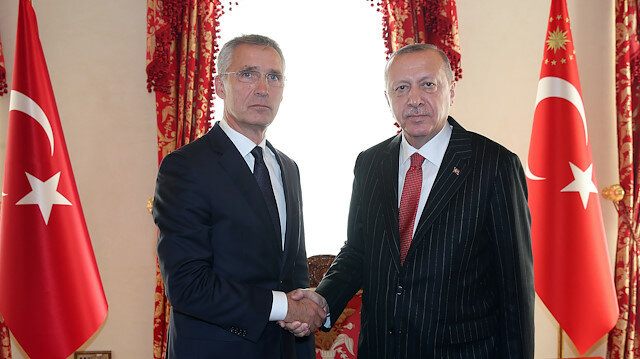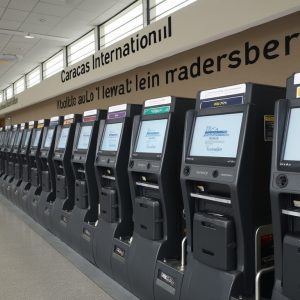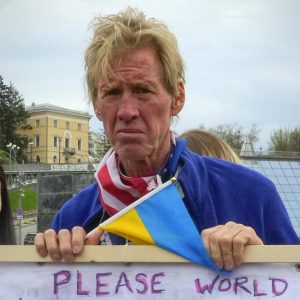TURKEY IS TRYING TO EMBROIL NATO IN THE AZERI-ARMENIAN WAR
By Hoda al-Husseini, posted on www.alarabiya.net 09 October 2020
(The author is a regular contributor to the London-based, Saudi-owned ash-sharq al-awsat newspaper and website. The article below was reposted on the al-Arabiyya website.)
TRANSLATED FROM THE ARABIC BY BARRY WEBB
The Secretary General of NATO Jens Stoltenberg is in Ankara to convince the President of Turkey Rejeb Tayyip Erdogan to halt the war against Armenia. Ilhami ‘Aleef, the Azeri president has rejected all calls for a cease fire as long as Armenia does not withdraw from the Nagorno-Karabakh region. After the events of last July there was a large gathering (of protesters) in Baku, the capital of Azerbaijan, demanding the return of Nagorno-Karabakh. Then the occurring of the current clash has attracted anew the attention of the regional powers such as Russia and Turkey. The situation now is escalating and carries with it a very real danger of becoming a wider geo-political clash.
[expander_maker id=”8″ more=”Continue reading” less=”Read less”]
Nagorno-Karabakh is a small mountainous region in the Caucasus which is situated within the Azerbaijani territory, but it is governed by an Armenian-speaking authority which it has installed for itself. Therefore, the clash includes a clear ethnic dimension. The Azeris are Turkish-speaking Shi’a Muslims, while the Armenians are “Orthodox” Christians. In addition to that both Armenia and Azerbaijan are small countries in the Caucasus surrounded by countries that are much more powerful. To the southeast lies Iran which has a large Azeri community, and maintains good relations with Baku because of their joint Shi’a creed.
To the north, with the exception of Georgia which suffers from long ethnic clashes of its own, there is Russia which is the country that has the greatest military power by far. And Moscow has interests in both Baku and Yerevan the capital of Armenia. Moreover, Russia is involved economically in Azerbaijan which is rich in Hydro-carbon resources.
However, as an Orthodox country it is friends with Armenia and has a military base in Gyumri, Armenia. And, in reality, Armenia is a party to the “Joint Security Treaty Organization” which is sponsored by Russia, the founding paragraphs which are a mechanism for joint defense which mirrors that specified in article 5 of the NATO treaty.
Article 4 of the “Joint Security Treaty Organization” stipulates that if one of the member countries is subjected to military aggression the (other) member states will consider it to be an aggression against all of them. However, that treat does not cover Nagorno-Karabakh since it is recognized internationally as a part of Azerbaijan which is not a party to the “Treaty of Joint Security.” Finally, the two countries are bordered in the west by Turkey which is a member of the NATO alliance but which aids the Azeris based on their joint Turkish heritage.
This scene sheds light on the geo-political conundrum in the Caucasus region which is also considered to be a region through which important pipelines run and explains the varied strong reactions to the recent breakout of violence there. Russia has called for self-restraint and has offered mediation, as has Iran. But the warring sides have rejected the two offers (at the time this essay was composed).
Both Moscow and Tehran are embroiled in other clashes. Moscow in Ukrainia, Syria, and Libya, and Iran in Iraq, Syria, Yemen, and Lebanon, and so neither of them want another armed fight close to their two countries which might harm their economic interests by derailing the energy infrastructure in the Caucasus. In addition to that the both of them have other reasons to avoid a clash: Iran does not want an escalation that might end up drawing in the participation of the Azeri Iranians. Then, Russia, should it be asked to intervene on the basis of the “Joint Security Treaty Organization,” is deeply concerned over any potential Turkish action to support Azerbaijan, because the possibility of delving into a direct battle with Turkey carries with it the danger of the NATO alliance entering into the game.
In reality, during the initial skirmishes last July between the forces of Armenia and Azerbaijan, Ankara actually expressed its readiness to defend Azerbaijan. And in the present situation, shortly after recent armed exchanges, Ankara repeated this commitment which has caused a new diplomatic division with a power which is outside of the region, and this is France.
The government of French President Emanuel Macron responded quickly when the fighting broke out and hosted (representatives of) the huge, and effective, Armenian community of France. However, Macron’s reason for moving stems most likely from the deterioration of France’s relations with Turkey over Turkey’s imposing its influence over Libya and the Eastern Mediterranean.
In the Eastern Mediterranean Turkey’s pressing demands of freedom (of movement for itself), by military force, are stirring argument since a little while back a Turkish naval ship activated radar aimed at a French unit. Then, after that Turkey sent a drilling exploration ship accompanied by a frigate to conduct a survey operation in waters which are internationally recognized to be subject to Greece. So, then, France sent two of its “Rafale” fighter jets and a naval ship to the region; then France signed a new arms sale deal with Greece.
When the recent clashes broke out in Karabakh, Paris called for halting the hostile actions, but the issue quickly transmuted to another difference with Ankara on the 30th of September when Armenia said that a Turkish F-16 shot down one of its Sukhoi 25s. Naturally, Ankara denied that and said: Armenia must withdraw from the territories under its occupation instead of resorting to the ruse of cheap propaganda. Then France announced that it is extremely concerned over Turkey’s warlike message which, in France’s view, encourages the Azerbaijanis to seize Nagorno-Karabakh.
Then Ankara responded with the threat that it is completely ready to what ever is necessary to help Baku in the field.
Clearly, the issue has taken on a wider international dimension, and if the situation continues to escalate in the Caucasus then the consequences will continue to reverberate way beyond the region. Turkey’s insistence on supporting Azerbaijan stirs up fears of an imminent Turkish military operation against Armenia. And, as we noted, Armenia is a party to the “Joint Security Treaty Organization” which stipulates that an attack against one member shall be considered an attack against all. And, that means that if Armenia is subjected to the attack, and Moscow does not intervene, then the credibility of the “Joint Security Treaty” which Moscow is sponsor of, will be kaput as will Russia’s image as a great power. And this is something upon which President Vladimir Putin has placed his domestic political legitimacy.
However, a direct Russian attack against Turkish territory might push Ankara–in spite of the recent tensions it has with many of the members of the NATO alliance–to implement the machinery of NATO’s collective security (clause). The application of article 5 in this manner, and in the context of a Turkish aggressive act, will in and of itself lead, in a very basic manner, to a diplomatic conundrum for the alliance and its leading power the United States. So, should (the U.S.) provide help to Turkey along with the danger that entails with regards to war with a nuclear armed Russia, or should (the U.S.) turn its back on the Turks whose mission has come to be sowing problems in many countries? (The conundrum for the U.S.) will be the pressure that the Armenian Lobby which is powerful in America will apply –which (if the U.S. follows and turns its back on Turkey) would also seriously demolish the credibility of NATO. Thus, Turkey’s ambitions to ignite a war embroiling the NATO alliance in it, will cause it to feel that it has achieved victory over it and all the countries that belong to it (by either bending NATO to its will, or destroying it).
What mitigates the Turkish turmoil is that there is no desire by anyone to plunge into a war because of the Nagorno-Karabakh region because none of the (outside) countries have any great interest in this issue. Therefore, the most probable final outcome will be a negotiated settlement perhaps through the auspices of relatively neutral parties such as the EU, or perhaps even Russia itself. Last Monday evening the foreign ministers of Russia, France, and America called for calming down the clash.
At any rate, if the skirmishes do not take place on the territories of Armenia or Azerbaijan, then there will be no legal basis calling for either of their allies to intervene militarily. Therefore, because these territories (Nogorno-Karabakh) lay outside the geographical zones stipulated by their respective treaties, then, and this is most important, there remains the possibility that Russia and Turkey will engage in the fighting by indirect means, (as they have done in) other clashes, by proxy.
The clash is escalating locally. Azerbaijan is aware of the power of its weapons from Israel and Turkey, and Armenia is aware of its abandonment by the world. (Hopefully) it should (therefore) never evolve into a wider clash between great powers. However, that being said, it is clear that the most basic important (thing to remember) about the fighting currently taking place in Karabakh is that it does not spring from regional and local gains, but the clash has the capacity to ignite a wider war between the opposing alliances. (It is in this regard that) Canada has halted all weapons sales to Turkey because they are being used in Azerbaijan.
Erdogan knows that it is not the right time for World War Three to be ignited, since, if it does break out then the Sultanate (meaning the Caliphate) will never return and will never have dominion.
A child asked his grandmother as they were fleeing from Karabakh to Yerevan, “why she was so afraid of Erdogan who has said that (with regards to its involvement) in the Syrian war, that Turkey has never committed the slaughter of civilians in history.” The grandmother (then) asked the child to remember history: “The genocide of the Armenians in 1914, the genocide of the Assyrians in 1914, the (Turkish-caused) famine of mount Lebanon in 1915, the Greek genocide of 1913, the butcheries of al-Humeidiyyah in 1894, the butcheries of Diyar Bakr in 1895, the Batak (Bulgaria) slaughter of 1876, the Idlib butchery of 1850, the Adhanah butchery of 1909.”
Erdogan loves to recall history, but history is never a clean slate, whether in times long ago, or modern times. So, how does history give Erdogan the cover, and the pretext, for Turkey to attempt to reclaim Karabakh–while the world, pre-occupied, watches a new slaughter or ethnic cleansing (taking place)?
COMMENTS and ANALYSIS:
Since this essay was published, a cease-fire was declared making her comments obsolete
–only to have the cease fire almost immediately shattered by both sides making her thoughts relevant once again. The author has a tendency to syntactically not complete sentences, or thought processes, forcing the translator to insert (within parentheses) the completion of the thought. I produced this translation this way (verbatim) in order to keep the translation as close to the original as possible to give English-speaking readers a direct look into the author’s thinking on the current struggle in the Caucasus, and as a representation of the thought of a considerable swath of the Arabic-speaking world.
While both sides have accused the other of starting this latest round of fighting between Armenia and Azerbaijan, the evidence of the presence of Syrian “mercenaries” fighting on behalf of Azerbaijan from the very moment that the war broke out points the finger directly at Turkey as being the real instigator behind this struggle–as pointed out in a previous article on this site. Not only have all the nominally pro-West Arab states in the Middle East expressed that view, and not only has French intelligence and the French President concurred, but even the head of NATO is saying the same thing, as the top of Ms. al-Huseini’s essay pointed out.
While Turkey has steadfastly denied that it is involved in the Azerbaijan battle with Armenia and has also denied that it has sent any mercenaries to Syria, al-Arabiyya TV has recordings of Syrian dialect Arabic being spoken by combatants within the Azerbaijani side. At the very beginning of the Azerbaijan-Armenia fight Syrian human rights workers had reported that Turkey was sending Syrians to Azerbaijan to fight against the Armenians. Armenia has also shot down Turkish-made drones.
Azerbaijan’s accusations that Armenia is using “mercenaries” also has credibility. There are numerous reports of Greeks, Kurds, and even Yazidis volunteering to fight for the Armenians. All of these peoples have suffered genocides and massacres at the hands of the Turks in past history and unlike most of the West, recognize this current battle for what it really is. Erdogan is not the only one who knows history. The appearance of the non-Armenian “mercenaries/volunteers” appears to have occurred later than, and only as a reaction to, Azerbaijan’s use of Syrian (mostly likely ISIS/al-Qaeda) mercenaries.
While the evidence of Turkey’s involvement in this war, even if only using Syrian mercenaries and Azerbaijan as proxies for their ultimate aim, is solid, there is, so far, no evidence of Russian involvement, even indirectly. However, that could change with the deterioration of the above-mentioned Moscow-negotiated cease fire. Whether or not this war then remains only a Russo-Turkish war by proxy, as in Syria and Libya, or expands to something much wider, remains to be seen.
EGYPTIAN-RUSSIAN NAVAL EXERCISES IN THE BLACK SEA
In a related matter al-Arabiyya TV and website reported on 11 October 2020 that (an unspecified number of) Egyptian naval units were headed to the Black Sea to engage in training exercises and maneuvers with the Russian navy. These naval exercises are to continue until the end of the year.
In this regard they quoted an Egyptian military and strategic authority and member of the Egyptian parliament, General Hamdi Bakheet, that there were messages to Turkey behind these maneuvers. From the Egyptian standpoint, it was to warn Turkey that its “fooling around” with Libya and holding naval maneuvers near the coast of Libya can be met in kind with Egyptian naval maneuvers along the coast of Turkey. The Russian message to Turkey, according to the Egyptian military authority, is to warn it against “fooling around” in the Nogorno-Karabakh fight.
The al-Arabiyya reports have also noted that Egypt has been conducting naval training exercises and maneuvers in the Eastern Mediterranean with the French navy, the Greek navy, and the Spanish navy, (and these maneuvers) are also presented as a strong message to Turkey.
FLASH: TURKISH TROOPS IN DISPUTED AREA
As I write this, late Sunday 11 Oct., al-Arabiyya has just reported, quoting Armenian sources, that Turkish special forces, dressed in black, have been seen entering the town of “WarGonzo” (sic, possibly means “Hadrut”) in Nogorno-Karabakh. The purpose of this move is allegedly to raise the Azerbaijani flag there.
This would appear to me to be a direct violation of the 1994 internationally recognized agreement regarding Nogorno-Karabakh, as well as a direct slap in the face to Russian President Vladimir Putin.
1938-39 anyone?
//////////////////////////////
Barry Webb has logged a 25-year career as an Arabist for the NSA, has two MA degrees in related subject matter, and is currently a Senior Fellow with Americans for Intelligence Reform www.intelreform.org. He is the author of Confessions of an (ex) NSA spy: Why America and its Allies are Losing the War on Terror. His website is www.barrywebbauthor.com
[/expander_maker]




